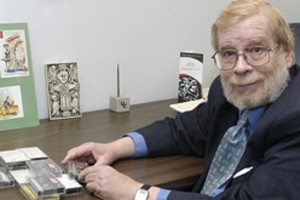
Celtic Book Published in Honor of UC English Professor
English Professor Edgar Slotkin, an international expert in Celtic languages, literatures and folklore, is the honoree of the 2011 CSANA Yearbook. The book, CSANA Yearbook 8-9, Narrative in Celtic Tradition: Essays in Honor of Edgar M. Slotkin, is published by the Celtic Studies Association of North America and seeks to foster interdisciplinary approaches to Celtic Studies.
Youve contributed essays to the CSANA Yearbook in years past for your colleagues in the field. This year, however, the CSANA Yearbook is dedicated to you. How does that feel?
They surprised me with it. I was moved.
How important is the Celtic Studies Association of North America to the study of Celtic?
We started it as a way for celticists here to stay in touch. Most of us had jobs where we were the only celticist on the faculty. There is an international Celtic Congress every four years, but thats a long time to go without professional contact. We have a yearly meeting, publish a Yearbook, and maintain an ongoing bibliography for the discipline. Over the years we have expanded internationally. Our membership includes most scholars, not just here but over the world. Our incoming president is from Cambridge University. I think we have become an important and essential element in Celtic Studies.
What is included in the edition of the CSANA Yearbook that honors your work?
In the festschrift for me, there are 19 essays on Irish and Welsh topics from American, Canadian, Irish, Welsh and English scholars. The festschrift has a picture of me, suitable for framing. It is published by Colgate University Press. In the next edition, CSANA Yearbook 10, there are a variety of essays including one by me: Frank OConnors Irish Story, which addresses the only story in Gaelic that OConnor wrote.

Celtic Studies Association of North America.
Youve been studying Celtic for more than 40 years now. Where does your original interest stem? What compels you to continue studying it all these years later?
The long answer to that is too longa biography. The short answer is that when it came time to apply to graduate school, I decided that I wanted a medieval studies program. When I was accepted in Harvards Department of Celtic Languages and Literatures, I thought it would be an interesting way to go. (It was the 60s, after all.) It was a good choice for me since the field is interdisciplinary and always challenging. Unless the field you are working in offers you a challenge, you will get bored over 46 years, and I am never bored with my research.
What are you working on now?
I have a number of projects, but two are top priorities. I need to finish the edition of the 9th century Irish tale
Fled Bricrenn
(Bricrius Feast) which I started with my colleague, the late Professor Proinsias Mac Cana of the Dublin Institute for Advanced Studies. And I want to collect my various papers on folkloristics and Celtic literatures into something like a coherent monograph.
Related Stories
How to keep birds from flying into your windows
July 3, 2024
UC College of Arts and Sciences professor Ron Canterbury tells the Indianapolis Star that simple steps can prevent birds from strike windows around your home or business. Yahoo! News shares the story.
Meet UC’s Miss Ohio
July 1, 2024
UC biomedical science student Stephanie Finoti credits UC for helping to prepare her for the Miss Ohio Scholarship Pageant. She will represent Ohio in the national competition in January.
UC alum credits journalism program with early success
June 26, 2024
Zachary Jarrell came to the University of Cincinnati in 2019 to pursue a degree in statistics. In 2023, he graduated with a Bachelor’s in Journalism. For many undergraduates, the journey through college rarely takes the expected track. Detours happen, and majors change. When plans switch up, it can be helpful to a student’s success to find support. For Jarrell, it was the people he worked alongside in the journalism department who helped him on his journey. It has left a lasting impression on his life so far, guiding him to multiple internships as an undergraduate, real-world experience in prominent news outlets, and eventually a successful career in the highly competitive field of journalism.
